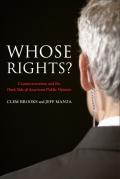Main navigation
 In their RSF book Whose Rights? Counterterrorism and the Dark Side of American Public Opinion, sociologists Clem Brooks and Jeff Manza present fascinating new data on what Americans think about the counterterrorism agenda put in place after the 9/11 terror attacks. Their evidence comes from three national telephone surveys conducted between 2007 and 2010; their surveys included embedded experiments that sought to track whether key factors -- information about a hypothetical terrorist attack, for example, or national identity cues -- affected attitudes towards policies like torture or stricter airport security. Below are three broad conclusions, along with explanatory excerpts from Brooks and Manza's book:
In their RSF book Whose Rights? Counterterrorism and the Dark Side of American Public Opinion, sociologists Clem Brooks and Jeff Manza present fascinating new data on what Americans think about the counterterrorism agenda put in place after the 9/11 terror attacks. Their evidence comes from three national telephone surveys conducted between 2007 and 2010; their surveys included embedded experiments that sought to track whether key factors -- information about a hypothetical terrorist attack, for example, or national identity cues -- affected attitudes towards policies like torture or stricter airport security. Below are three broad conclusions, along with explanatory excerpts from Brooks and Manza's book:
1. 'Threat Priming'
A theorem of classical social psychology is that the successful deployment of threats tends to generate highly illiberal and rights-restricting responses on the part of individuals. Threat is often easy to manipulate and more motivating than simple fear. Our experiments complement this scholarship in two ways. First, with respect to time, our results extend previous estimates with new survey data and experiments spanning the years 2007, 2009, and 2010. Second, using comparatively modest experimental cues—typically involving a single-sentence reference such as “What if the government was responding to a terrorist act that had just taken place?”—we find significant impacts on survey responses.We have been struck by the strength of the threat results on both counts. [...] As we discussed in chapter 4, threat primes are the single largest effect in experiments in which they are deployed. We have also been surprised by the magnitude of such impacts in 2010, nearly a decade after the original 9/11 effects. Far from declining in efficacy, threat priming appears remarkably potent.
2. American Citizenship [We] find novel evidence for the operation of national identity as a significant lens through which Americans view policy. In our experiments, when respondents are primed to think that American citizens are the target of coercive policies, support tends to decline significantly. Similarly, an alternative cuing of policy targets as foreign nationals tends to raise support. We find the American public gives priority to their own rights and liberties but shows far less willingness to extend protections to the rest of the world’s citizens. This underlying restriction is notable in its own right and parallels rather provocatively the far greater rights violations meted out to foreign nationals in the war on terror.
Experimental cues involving national identity characteristics operate the same among whites and nonwhites and among self-identified Christians versus others. Even more telling evidence comes from our experiments manipulating the national identity status of a key insider group (Christians) and a second outsider group (people from the Middle East). So powerful is the impact of U.S. citizenship status that its experimental manipulations can prompt respondents to display indistinguishable affect toward these two initially polar groups. Under experimental conditions, Christians who are not U.S. citizens now elicit the same degree of emotional warmth as people from the Middle East who are U.S. citizens. American citizenship status, in short, is remarkably important as such, and not just as a cover for other, different identity attributions.
3. Middle East Identity
Transnational ethnic identities appear to matter a great deal. We know from our feeling thermometer experiments that groups such as Muslims and people from the Middle East elicit much cooler responses, even when we compare systematically with established domestic outsider groups such as blacks. Armed with these results, what we have looked further into is whether the novel transnational ethnic identity cues also operate when it comes to policy attitude formation.Our results suggest an affirmative answer. Even when holding constant American citizenship status, the ethnic cue for people from the Middle East tends to have significant effects. By itself, it increases support for counterterrorism policies and measures. As a target group, then, it is not just distinctions between U.S. citizens and others that matter. A further, potent source of symbolic bias is at work.





